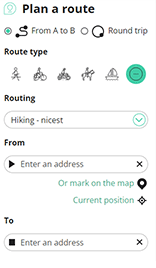In 1849 , the well was discovered by Mr. Schaltin in the basement of his house called 'prince Condé'.
In October 1863 he drilled the well to tap spring water. In May 1863, the Schaltin firm, Duplais et Cie, applied to declare the source of public interest and be allowed to exploit it. In December 1863, the court of Verviers rejected the claim of the city of Spa against the owner and operators of the source. The city of Spa took this step because the volume of the spring water in the nearby Peter-de-Grote spring decreased. In 1879, a rectangular space of eight by ten meters was used, with a glass roof and a ceramic floor. The walls were covered with rocks in which all kinds of plants grew. The water was drawn from two wells and collected in two black marble basins, under an artificial cave. For more than 20 years, Schaltin exported a lot of spring water in collaboration with the Vichy company and was therefore an important competitor. Every year they filled about 50,000 bottles of water. This lasted until 1903 when the city of Spa bought the source for 40,000 francs.
The water of the Prince de Condé source comes from the same subterranean flow as that of the Peter the Great source and the Armes d'Autriche. The water is distinguished by a richer mineral composition that is acquired during the last part of the underground trajectory.
In 1988 a glass pyramid was built next to the house. Following the 19th century stained glass window that frames the building of the original source, the current pyramid aims to be the architectural reflection of the 20th century. The building hosts art exhibitions throughout the year.
Louis I of Bourbon-Condé , Prince of Condé, Duke of Enghien (Enghien) (Vendôme, 7 May 1530 - Jarnac, 13 March 1569) was a Prince of the Blood of the House of Bourbon and the main Protestant leader during the first three Huguenot Wars . He was killed at the Battle of Jarnac. Carried around on a donkey, his corpse was the object of derision from the Catholic army before being displayed for two days on a table in the castle of Jarnac.
Source: Willem Vandenameele
![]() | | Public | Catalan • Dutch • French • German • Italian • Spanish
| | Public | Catalan • Dutch • French • German • Italian • Spanish

Select one of the most popular activities below or refine your search.
Discover the most beautiful and popular trails in the area, carefully bundled into appropriate selections.
Source: wikimedia
Select one of the most popular categories below or be inspired by our selections.
Discover the most beautiful and popular attractions in the area, carefully bundled in appropriate selections.
Source: wikimedia
With RouteYou, it's easy to create your own customised maps. Simply plot your route, add waypoints or nodes, add places of interest and places to eat and drink, and then easily share it with your family and friends.
Route planner

<iframe src="https://plugin.routeyou.com/poiviewer/free/?language=en&params.poi.id=8250131" width="100%" height="600" frameborder="0" allowfullscreen></iframe>
Try this feature for free with a RouteYou Plus trial subscription.
If you already have such an account, then log in now.
© 2006-2024 RouteYou - www.routeyou.com